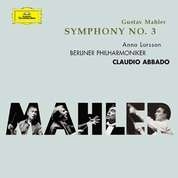|
You are reading the older HTML site Positive Feedback ISSUE 12march/april 2004
MAHLER: Symphony No. 3
MAHLER: Symphony No. 3*;
HÖLLER: Der Ewige Tag Claudio Abbado's second recorded Mahler series has now passed the halfway point, with only the three middle symphonies to go. (I suspect that his Vienna Eighth, from the mid-Nineties, marks a transition between the two cycles and won't get a remake.) DG recorded this Third in London, at a rapturously received 1999 Royal Festival Hall concert. Hearing the performance, the acclaim is difficult to understand. The reading leaves a good initial impression. Abbado, more conscientiously than any other conductor, takes pains to observe the score's piano and pianissimo markings - there are more of them than one had realized. The first movement's nature sounds, ordinarily a riot of color and melody, become a play of ghostly, elusively flickering shadows, foreshadowing the Scherzo of Mahler's Seventh. Here and there, some usually buried contrapuntal detail emerges attractively, simply because the surrounding musical elements are less aggressively projected. But there can be too much of a good thing. Surely, within a piano dynamic scheme, one can set the principal themes in sharper relief against their accompaniments to draw the ear, or allow them their natural ebb and flow? Not for Abbado, alas, who insists on relentlessly suppressing everything. The phrases seem enervated, the textures homogenized. The cumulative effect is to drain the score of color and, ultimately, impact. Abbado can't entirely quash his principals' musical instincts: the unbilled trombone soloist is solemn and expressive in the first movement, and the solo trumpet offers pillowy, buoyant tone and articulations. Otherwise, the Berlin orchestra's sound and style, some fifteen years post-Karajan, remains singularly unidiomatic. The string tone is diffuse in the singing melodies, and turns glassy as the lines ascend. In the climaxes, the sonority is thick and opaque: to cite one example, the players give us all the noise of the third movement coda, but none of its unbuttoned exuberance. Anna Larsson's warm, lustrous, almost-contralto voice makes the Nietzsche song a bright spot in an otherwise wan performance, even if, paradoxically, she sings rather louder than the indicated dynamics. (In this movement, as in most recent recordings, the oboe glissandi are grotesquely distorted in a manner that the score justifies tenuously at best.) And the final Adagio, while still tonally unfocused, has that ebb and flow missing earlier. But it's too little, too late. Semyon Bychkov's feel for orchestral color and texture should render him a natural Mahlerian, especially in the Third with its myriad timbral blends. Round, imposing unison horns usher in a dramatic, characterful reading of the first movement, and the solo trombone is plangent. The finale is similarly fine: the strings are full-boded in the warm, flowing opening theme, and Bychkov shapes and weights the melodic turns of its later elaborations with feeling, building to a thrilling, satisfying conclusion. The music unfolds and "breathes" naturally throughout. This performance, clearly, offers all the variety and dynamism missing from Abbado's. But Avie's sound, for all its richness and impact, is literally off-balance. It’s frustrating when some attractive but clearly secondary woodwind phrase obscures the middle movements’ feathery violin figures; even the Menuetto’s sustained cellos draw focus. In the third movement, the clarinet’s bird-calls, miked up the bell, drown out the (onstage) muted trumpet. The accumulation of such anomalies ultimately rules Bychkov's carefully prepared, vibrant performance out of court, for all the beautiful playing. For what it's worth, Marjana Lipovšek is a pallid, tonally diffuse soloist whose intonation isn't always dead center. The companion piece, by a modern German composer, makes some interesting sounds, but neither consistently nor coherently enough to justify its twenty-plus-minute length. Stephen Francis Vasta
|

